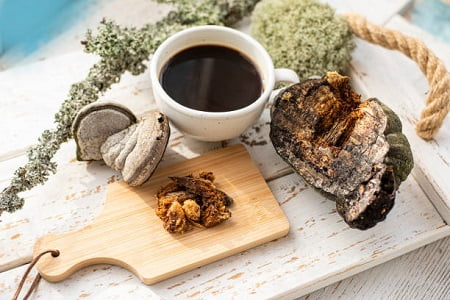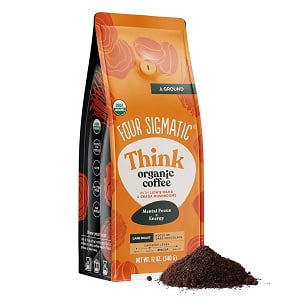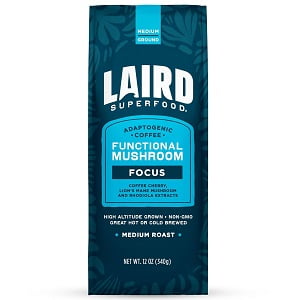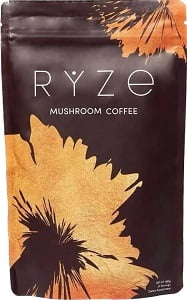Mushroom coffee has gained significant popularity recently, with many YouTubers, TikTokers, and nutrition influencers promoting it as a trendy, health-conscious beverage.
This fungi-infused brew has been making serious waves, with the global mushroom coffee market expected to hit a whopping $4.12 billion by 2030[1].
But what’s the deal with this earthy elixir? Is it just another fad, or is there something more brewing beneath the surface? Whether you’re a caffeine fiend looking for new flavors or you’re curious about the potential health perks, stick around. I’m about to spill the beans on everything you need to know about mushroom coffee.

What is Mushroom Coffee?
Mushroom coffee is a mixture of ground medicinal mushrooms and traditional coffee beans. Mushroom Coffee doesn’t involve simply adding mushrooms to your regular brewed coffee. Instead, the mushrooms are carefully processed and blended with coffee grounds to create a cohesive mixture. They are blended so uniformly that you might not notice any difference in the taste.
The mushrooms used in these blends are not the culinary varieties you see in your local grocery store. Rather, they are medicinal mushrooms known for their potential health benefits. Some of the most common mushrooms used in mushroom coffee include:
- Chaga: Known for its high antioxidant content
- Turkey Tail: Believed to support immune function
- Lion’s Mane: Associated with cognitive health and mental clarity
- Reishi: Often used for stress reduction and sleep improvement
- Cordyceps: Linked to increased energy and athletic performance
How is Mushroom Coffee made?
Mushroom coffee has come a long way from its early origins during World War 2 when Coffee was a rare commodity.
At that time, folks in Northern Europe started brewing Chaga mushrooms with a little addition of coffee to fulfill their caffeine needs. Making Mushroom coffee typically involved soaking chunks of Chaga mushroom in water overnight, then pressing out the liquid. This mushroom-infused water was then boiled with coffee beans, making a brew with the flavors and potential benefits of both coffee and mushrooms.
Modern production methods have significantly refined the process of making Mushroom Coffee. Now it is made by extracting the fruiting bodies of mushrooms such as chaga, lion’s mane, or reishi to concentrate their bioactive compounds, also known as adaptogens.
The extract is then dehydrated to produce a fine powder. This powder is carefully blended with ground coffee beans to ensure a consistent mixture that balances the taste of coffee with the beneficial properties of mushrooms.
Mushroom coffee is now widely available in different forms, including:
- Ground coffee blends
- Single-use pods
- Instant coffee sachets
What are the Benefits of Mushroom Coffee?
Mushrooms have been a staple in traditional Chinese medicine for centuries[2], and the adaptogens they contain are believed to have positive effects on health.
Here are some of the key benefits:
1- Improved Immunity: Extracts from turkey tail mushrooms have shown promise in enhancing immune function. Research indicates that these extracts may increase the production of immune-activating compounds and reduce inflammation at the cellular level[3].
2- Enhanced Brain Function: Lion’s mane mushroom has been linked to improved cognitive performance. Laboratory studies suggest it may promote mental clarity and concentration, though more research is needed to confirm these effects in humans[4].
3- Stress and Anxiety Relief: Lion’s mane mushroom has also been associated with potential mental health benefits. Some studies indicate it may support neuronal growth and survival, particularly in brain regions involved in cognitive and emotional function. This has led researchers to explore its potential in addressing anxiety, stress, depression, and sleep disorders[5].
4- Anti-Allergic Properties: Some studies suggest that Chaga mushrooms may suppress the activity of immune cells responsible for allergic responses to certain foods, potentially offering relief to allergy sufferers[6].
5- Heart Health Support: Reishi mushrooms have shown promise in cardiovascular health. Some studies indicate they may help protect against heart disease by improving cholesterol profiles and blood pressure levels[7].
It’s important to note that while these potential benefits are intriguing, the research is not yet extensive or conclusive. Many of these studies have been conducted in laboratory settings or with limited human trials, and more comprehensive research is needed to fully understand the effects of combining mushrooms with coffee. Therefore, the benefits should be viewed with a grain of salt.

Are there Side Effects of Mushroom Coffee?
One big problem is that we don’t know enough about mushroom coffee yet. Scientists haven’t done a lot of research on it. This means we’re not sure about things like:
- How much is safe to drink
- Who should or shouldn’t drink it
- If it mixes badly with any medicines
For people who get jittery from regular coffee, mushroom coffee might still cause trouble. It has less caffeine, but it’s not caffeine-free. Some folks might have trouble sleeping or feel anxious if they drink it.
Some medicinal mushrooms contain high levels of oxalates. For people with kidney problems or a history of kidney stones, this could be problematic. Oxalates can contribute to the formation of kidney stones and may exacerbate existing kidney issues[8].
What Does Mushroom Coffee Taste Like?
Mushroom coffee has a distinctive flavor that can vary depending on the blend, but it typically has the earthy, somewhat umami taste of medicinal mushrooms with the familiar bitterness of regular coffee. The mushroom notes are subtle and don’t overwhelm the coffee itself, though they can impart a slightly woodsy undertone. The flavor isn’t as intense as straight mushroom or a strong mushroom soup but rather blends into the coffee base.
The coffee doesn’t taste bad, but it’s also not particularly tasty. Adding some milk, creamers, or sweeteners makes it better, giving it a creamier and sweeter taste. Milk also mellows down the earthy flavor, making it more palatable. I don’t like the taste of mushroom coffee without milk or cream, even though I usually like my coffee plain black!
Best Mushroom Coffee Brands
There are a few standout brands that offer excellent quality and taste in Mushroom Coffee
Four Sigmatic Mushroom Coffee
Four Sigmatic is my favorite organic mushroom coffee brand. It was one of the first to introduce mushroom coffee and has gained popularity for its excellent flavor and variety of blends.
Their flavors include the “Think Dark Roast,” a bold blend of lion’s mane and chaga mushrooms that makes a rich coffee with subtle chocolate notes. Another popular option is “Happy Gut,” a medium roast infused with turkey tail and Chaga mushrooms, that makes a smooth and lighter cup. Apart from that they also offer low caffeine and extra caffeine flavors.

Laird Superfood Focus Coffee
Laird Superfood’s Focus Coffee is another excellent choice, infused with organic lion’s mane mushroom extract. It delivers a delicious medium-bodied flavor without any noticeable mushroom taste.
The thing I like about Laird’s mushroom coffee is that it provides the benefits of adaptogens without imparting any mushroomy flavors to coffee drinks. This makes it an excellent option for those who don’t like the unusual and earthy notes in their coffee.

Ryze Mushroom Coffee
Ryze Mushroom Coffee is made with a blend of organic mushrooms, including Cordyceps, Lion’s Mane, Reishi, Shiitake, Turkey Tail, and King Trumpet, along with Arabica coffee, MCT oil, and coconut milk. This is an instant coffee powder that dissolves easily in hot water for quick preparation.
I find the taste of Ryze Mushroom coffee quite earthy and bitter, making it hard to enjoy without adding a lot of milk to mellow down the flavors.

How do you Make Mushroom Coffee?
Mushroom coffee can be brewed just like regular coffee. You can prepare it in a coffee pot, French press, or pour-over method. Simply follow the same process as you would for regular coffee to get a rich flavor from the coffee grounds and the blended mushroom extract.
For a smoother taste, I personally like to drink it with milk. Milk can help to smooth out any earthy notes from the mushrooms and create a more balanced, creamy taste. You can use any type of milk you prefer – dairy milk, almond milk, oat milk, or any other plant-based alternative.
Most Coffee brands offer Mushroom Coffee in Instant Sachets with additives like milk powders or coconut powders. These can be dissolved directly in boiling water to make a drink quickly. But most of these Instant options won’t taste any good!
How much Caffeine is in Mushroom Coffee?
Mushroom coffee typically contains less caffeine than regular coffee. This is because mushroom coffee blends usually combine an equal amount of mushroom powder with ground coffee.
Since the mushroom component doesn’t contain caffeine, it effectively cuts the caffeine content to about half that of regular coffee.
A standard serving of mushroom coffee generally contains around 50-60 mg of caffeine, compared to the 80-120 mg found in a typical cup of regular coffee.
So, Should you switch to Mushroom Coffee?
There are very limited scientific studies on the actual benefits of mushroom coffee. That being said, mushroom coffee doesn’t appear to cause any harm, so you can certainly try it for yourself to see if you experience any personal benefits
As for my personal experience, I’ve tried mushroom coffees from various brands, but I honestly don’t like the taste. I drink coffee mainly for its flavor and caffeine boost, so mushroom coffee doesn’t really fit me.
Check out other Coffee Varieties
FAQs
Does mushroom coffee make you high?
No, mushroom coffee does not make you high. It’s made with medicinal mushrooms, not magic mushrooms, and contains no psilocybin (the compound that causes hallucinations). Mushroom coffee is completely safe to drink and won’t produce any psychoactive effects.
Is mushroom coffee more expensive?
Yes, mushroom coffee is more expensive—it’s almost double the cost of regular coffee due to the added medicinal mushroom extracts and specialized processing.
References:
- https://www.grandviewresearch.com/industry-analysis/mushroom-coffee-market-report
- https://www.ncbi.nlm.nih.gov/pmc/articles/PMC3942920/
- https://www.uclahealth.org/news/article/turkey-tail-mushrooms-act-as-nonspecific-immune-modulators
- https://pubmed.ncbi.nlm.nih.gov/38004235/
- https://www.medicalnewstoday.com/articles/323400
- https://www.sciencedirect.com/science/article/abs/pii/S1567576919326608
- https://pubmed.ncbi.nlm.nih.gov/30806268/
- https://www.ncbi.nlm.nih.gov/pmc/articles/PMC8913114/



